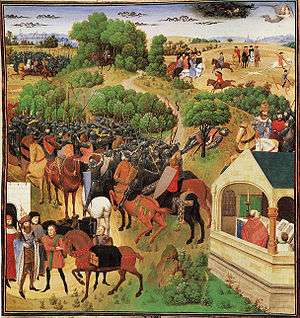
The Song of Roland (French: La Chanson de Roland) is an 11th-century chanson de geste based on the deeds of the Frankish military leader Roland at the Battle of Roncevaux Pass in AD 778, during the reign of the Emperor Charlemagne. It is the oldest surviving major work of French literature. It exists in various manuscript versions, which testify to its enormous and enduring popularity in Medieval and Renaissance literature from the 12th to 16th centuries.
The epic poem written in Old French is the first[1] and one of the most outstanding examples of the chanson de geste, a literary form that flourished between the 11th and 16th centuries in Medieval Europe and celebrated legendary deeds. An early version was composed around 1040 AD, with additions and alterations made up to about 1115 AD. The final poem contains about 4,000 lines.
- ^ "The Song of Roland". FordhamUniversity.edu. Archived from the original on 2015-02-04. Retrieved 2015-02-04.